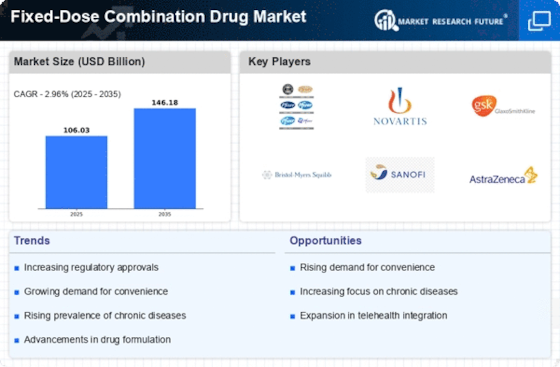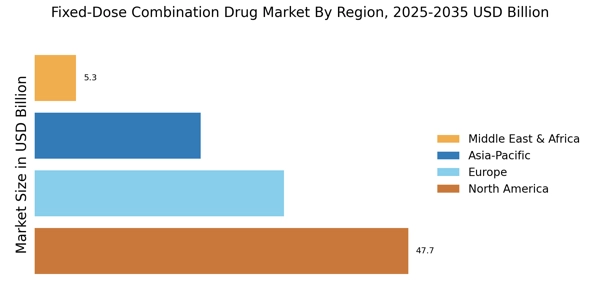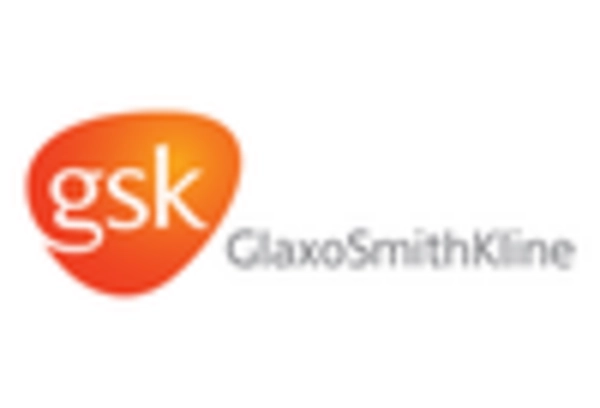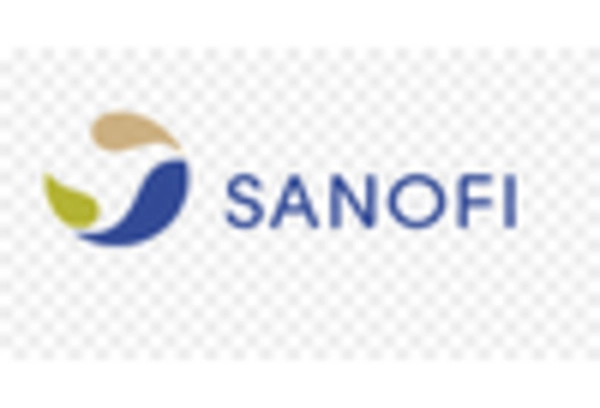Growing Aging Population
The demographic shift towards an aging population is a critical driver for the Fixed-Dose Combination Drug Market. Older adults often experience multiple chronic conditions, necessitating complex treatment regimens that can be difficult to manage. Fixed-dose combinations offer a practical solution by simplifying medication schedules and improving adherence. As the proportion of elderly individuals continues to rise, the demand for effective and convenient treatment options is expected to increase correspondingly. Reports indicate that by 2030, the number of individuals aged 65 and older will surpass 1 billion, further emphasizing the need for innovative healthcare solutions. The Fixed-Dose Combination Drug Market is likely to benefit from this trend, as it aligns with the healthcare needs of an aging population.
Advancements in Drug Delivery Systems
Innovations in drug delivery systems are significantly influencing the Fixed-Dose Combination Drug Market. Recent advancements in formulation technologies have enabled the development of more effective and patient-friendly combination therapies. These innovations include controlled-release formulations and novel delivery mechanisms that enhance the bioavailability of active ingredients. As a result, patients benefit from improved therapeutic outcomes and reduced side effects. The integration of technology in drug formulation is expected to propel the Fixed-Dose Combination Drug Market forward, as pharmaceutical companies seek to leverage these advancements to create more effective treatment options. The ongoing research and development in this area suggest a promising future for fixed-dose combinations, potentially leading to a wider array of therapeutic applications.
Rising Focus on Preventive Healthcare
The Fixed-Dose Combination Drug Market is witnessing a surge in interest due to the increasing emphasis on preventive healthcare. As healthcare providers shift their focus from reactive to proactive treatment strategies, the demand for medications that can prevent disease progression is on the rise. Fixed-dose combinations are particularly well-suited for this purpose, as they can target multiple risk factors simultaneously. For example, in the management of cardiovascular diseases, combinations that address hypertension and cholesterol levels are gaining traction. This trend aligns with the broader movement towards integrated care models, which aim to improve patient outcomes while reducing healthcare costs. Consequently, the Fixed-Dose Combination Drug Market is poised for growth as it aligns with the preventive healthcare paradigm.
Cost-Effectiveness of Combination Therapies
Cost considerations play a pivotal role in the Fixed-Dose Combination Drug Market. Combination therapies often provide a more economical solution compared to purchasing individual medications separately. This cost-effectiveness is particularly appealing to healthcare systems and patients alike, as it can lead to reduced overall treatment expenses. For instance, studies indicate that fixed-dose combinations can lower the financial burden on patients by up to 30%, making them a preferred choice in many therapeutic areas. As healthcare costs continue to rise, the demand for cost-effective treatment options is expected to drive the growth of the Fixed-Dose Combination Drug Market. Pharmaceutical companies are likely to focus on developing innovative combinations that not only enhance therapeutic efficacy but also provide economic advantages.
Increasing Demand for Simplified Treatment Regimens
The Fixed-Dose Combination Drug Market is experiencing a notable shift towards simplified treatment regimens. Patients and healthcare providers increasingly prefer medications that combine multiple active ingredients into a single dosage form. This trend is particularly evident in the management of chronic diseases, where adherence to complex regimens can be challenging. By offering fixed-dose combinations, pharmaceutical companies can enhance patient compliance, potentially leading to better health outcomes. According to recent estimates, the market for fixed-dose combinations is projected to grow at a compound annual growth rate of approximately 7.5% over the next five years, driven by this demand for convenience and efficacy. As healthcare systems continue to prioritize patient-centered care, the Fixed-Dose Combination Drug Market is likely to expand further.

















